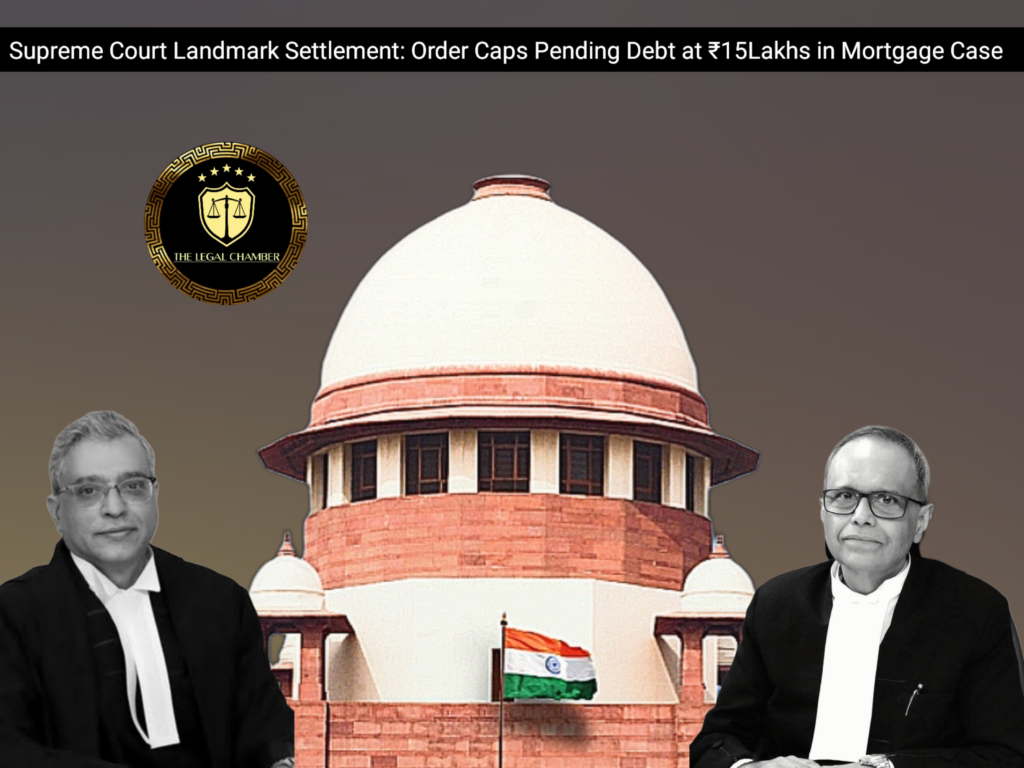
The Supreme Court partially allowed the appeal, modifying the High Court’s order by reducing the appellant’s liability to ₹15 lakhs as full and final settlement of the decree. The Court exercised its discretionary power under Article 142 to ensure complete justice, considering prolonged litigation, and clarified that the order was fact-specific and not a precedent.
Facts Of The Case:
The case originated from a money recovery suit filed by the respondent, V. Sudarsanan, against the original defendants for ₹79,69,544/- with 9% interest on a principal loan of ₹58,50,000/- secured by a mortgage. During the pendency of the suit, the appellant, Umedraj Jain, purchased the mortgaged property from the defendants and attempted to implead himself in the proceedings, but his application was dismissed—an order that attained finality. The trial court decreed the suit in 2010, and a final decree was passed in 2011 for the claimed amount with interest. The appellant’s subsequent challenges to the decree failed, leading to prolonged litigation. By 2016, the appellant had paid ₹1.15 crore, prompting the High Court Master to close the proclamation proceedings. However, the respondent contested this, claiming an additional ₹19.24 lakhs was still due. The Single Judge ruled in favor of the respondent, directing the appellant to pay ₹19,54,946/-, a decision upheld by the Division Bench. On appeal, the Supreme Court, acknowledging the protracted legal battle and to avoid further delays, exercised its discretionary power under Article 142 and reduced the appellant’s liability to ₹15 lakhs as full and final settlement, emphasizing that the order was confined to the case’s unique circumstances.
Procedural History:
The case began with a money recovery suit filed by the respondent before the trial court, which decreed the claim in 2010 and issued a final decree in 2011. The appellant, who had purchased the mortgaged property during the suit’s pendency, failed in his attempt to implead himself in the proceedings. His subsequent challenges to the decree were dismissed at every stage, including appeals before the High Court. In 2016, after the appellant paid ₹1.15 crore, the High Court Master closed the proclamation proceedings. However, the respondent contested this, leading the Single Judge to reopen the case and direct an additional payment of ₹19.54 lakhs—a decision upheld by the Division Bench. On appeal, the Supreme Court intervened, modifying the High Court’s order and capping the appellant’s liability at ₹15 lakhs as full and final settlement under Article 142 of the Constitution, citing the protracted litigation and unique circumstances of the case.
READ ALSO:Supreme Court : Res Judicata & Limitation Apply Even if Court Grants Liberty
Court Observation:
The Supreme Court acknowledged the protracted litigation spanning over a decade and noted the appellant’s payment of ₹1.15 crore towards the decree. The Bench observed that continuing the legal battle would only lead to further delay and unnecessary expenses for both parties. Exercising its extraordinary jurisdiction under Article 142 of the Constitution, the Court emphasized the need for complete justice and equitable resolution in light of the peculiar facts of the case. While the High Court had upheld the respondent’s claim for an additional ₹19.54 lakhs, the Supreme Court found it just and proper to reduce the liability to ₹15 lakhs as a full and final settlement, balancing the interests of both parties. The Court clarified that this order was fact-specific and should not be treated as a precedent, underscoring its discretionary power to ensure fairness in exceptional circumstances.
Final Decision & Judgement:
The Supreme Court partially allowed the appeal, modifying the High Court’s order by reducing the appellant’s outstanding liability from ₹19.54 lakhs to ₹15 lakhs, to be paid within two months as full and final settlement of all claims under the decree. The Court exercised its extraordinary powers under Article 142 of the Constitution to ensure complete justice, considering the prolonged litigation and the appellant’s prior payment of ₹1.15 crore. The Bench emphasized that this order was strictly confined to the peculiar facts of the case and should not be cited as a legal precedent. By capping the liability, the Court aimed to balance equity and bring closure to the long-standing dispute, while safeguarding the respondent’s legitimate dues. The judgment disposed of all pending claims, bringing finality to the litigation.
Case Details:
Case Title: Umedraj Jain vs. V. Sudarsanan Citation: 2025 INSC 827 Appeal No.: Civil Appeal No. 7742 of 2025 Date of Judgment: July 14, 2025 Bench: Pamidighantam Sri Narasimha and Joymalya Bagchi
Download The Judgement Here